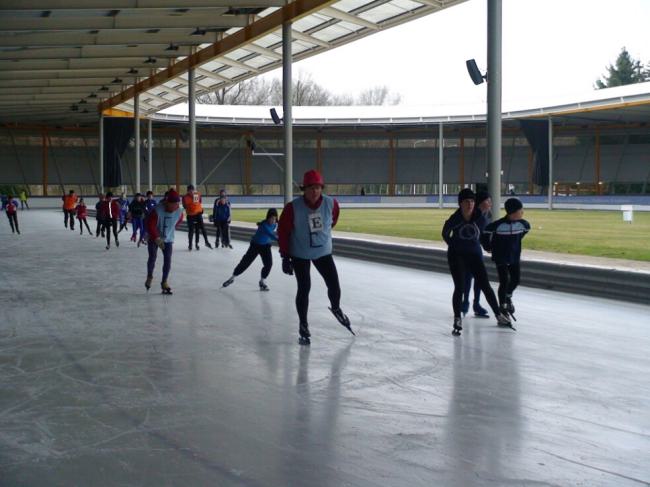Skate training
Subscribe for training groups track schedule safety rules
Providing skate training is the main activity of IJCE. About 50 trainers;(volunteers) provide these training sessions on the 400m track, the 30x60m outdoor track and the indoor track. Approximately 400 members of all ages participate in the training sessions, with riders ranging in age from 5 to 80+ years old. Many members train twice a week and the competition riders three to four times a week, with races in the weekends.
Children
Children up to about 10 years old train during the IJCE youth hour on Saturday morning (8:00 am) at the 30x60m outdoor track; the 'small track'. The training for the little ones consists mainly of games, building up to more serious skating exercises and skating movements to improve the skating skills. These skills are recorded in the knsb skills passport that every young participant receives from IJCE.
When the skating skills reach a sufficient level (about level 5) to be able to ride safely on the 400m track, the children move on. On the 400m track (the 'long track') they are divided into youth groups depending on age, skating ability and ambition. There are training groups for both starters and ambitious competitive skaters and everything in between. Enjoyment of skating is the most important thing, which is why listen to what the child wants to achieve and check in which group they feel at home.
The youth on the 400 m track trains twice a week at the youth hours: Monday evening 6:30 pm and Saturday morning 8:15 am.
Adults
Adult skate training sessions are available at all levels, from absolute beginners to advanced skaters to fast skaters. The marathon training group focuses on endurance and therefore on skating technique. The placement in training groups is based on the skating skills and technique of the skater; speed is secondary to that.
The trainer of a group determines a goal for the participants to achieve at the end of the season, depending on the ambition and wishes of the participant. If the goal is reached in the opinion of the trainer, the skater will move on to a higher group in consultation with the trainer of that group.
Adults train on Monday evenings and/or on Sunday mornings. At the IJCE youth hours on Saturday morning, only parents of skating children are admitted to training groups. In addition, a number of groups of advanced adults ride on this IJCE youth hour. Free riding is not possible during youth hours. The exact times are provided in our track schedule.
Short track skating
In addition to long track training, you can come to IJCE all year round for fast work on the short track, in other words: short track skating. The IJCE short track speed skaters continue their growth every year, both in number and in skating technique. Short track speed skating requires a special way of skating that is aids the development of your skating skills. More information about short track training can be found on our short track page
Participation is not without obligation
The trainer expects all skaters in the group to be present at all times. There is a season build-up in the training sessions which is disrupted if participants in a training are absent several times. In addition, absence and non-continuous presence are unpleasant surprises for our volunteer trainers, who put a lot of time and energy into preparing and providing the training sessions. The trainers enjoy the progress the group makes during the season, but that requires the participants to be present during training.
Safety
Training together means looking out for each other. To ensure the safety of everyone, there are rules of conduct that trainers and skaters must adhere to. The main rule is KEEP TO THE RIGHT AS MUCH AS POSSIBLE AT ALL TIMES. All track rules can be found here.
Cost
The cost of attending training courses depends on age, number of sessions and kinds of sports each season. Youth members pay a reduced rate, as do juniors, students and seniors. On the contribution page you will find all information about membership fees and training contributions.
